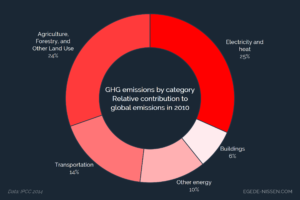Which activities and sectors produce the most greenhouse gas (GHG) emissions? The graph above shows us that they do not necessarily come from the places we might think. With a quarter of all emissions, agriculture and forestry is perhaps the biggest surprise. We tend to think of GHGs as coming from combustion of fossil fuels, in cars, furnaces and coal-fired power plants. But high meat and dairy consumption are two of the main drivers of agricultural emissions, and makes this sector a potent threat — not least because it’s not obvious.
It is perhaps transportation and electricity production that many might think would be the biggest problem. After all, coal and oil brought in the industrial age — and our current problem. Driving is the most visible (and pungent) form of carbon pollution in the lives of most people today, so it stands to reason that it’s also responsible for a lot of emissions. Cars and trucks clog our roads and pollute our cities, and oil companies have to shoulder much of the blame for the unfolding climate calamity. Yet on the global scale, transportation is a surprisingly small share of total pollution — only 14% (a different post will look at the distribution in Canada, the US and perhaps the EU).
Agriculture is one of the least visible and obvious sources of emissions, and therefore one of the most serious. Thanks in part to intensive factory farming, we’ve never had it so good in the industrialized world, but our agriculture is also wrecking ecological damage on a massive scale. While there is a lot of attention on electrifying vehicles or replacing coal with wind-power, there is far less attention on what to do with the sizable emissions coming from growing corn and rearing cows, mainly in the form of highly potent methane.
Another little surprise is the chunk labelled ‘Other energy’, responsible for 10% of all GHG emissions, and much of it too in the form of methane. That’s mainly emissions from the production and transport of fossil fuels. In other words, when you drive a car, you’re not only responsible for tailpipe emissions, but also all the upstream emissions that are emitter to bring that fuel to your car, including extraction, refining, shipping and waste emissions, such as natural gas flaring. All those emissions add up, so by decarbonizing vehicles and electricity, we would also get rid of a lot of the emissions in the ‘Other energy’ sector.
Finally, there’s electricity production and buildings, and it stands to reason these sectors produce a lot of emissions: about a quarter of all carbon emissions for the electricity sector, thanks mostly to legions of coal and gas-fired power plants (and some old, hyper-polluting oil burning power plants) that have been the mainstay of global electricity production since the Industrial Revolution. A little less than half of all electricity production is used by industry, and another almost equal chunk is used by buildings for things like heating, airconditioning, light and other things. Direct emissions by buildings, for their part, are responsible for about 6% of the total — that’s the use of gas and oil-powered furnaces, for example, or the use of biomass for cooking.

